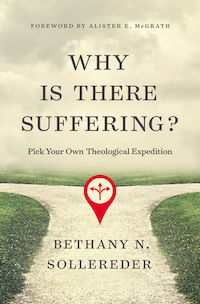
Shutterstock
We make theological decisions all the time: “I don’t believe God is like that”, “The Bible clearly says x…”, “Others may have different views, but I believe that the Church ought to…” We are exposed to multiple viewpoints on a whole range of issues, and have to prayerfully pick our way through them, Bible in hand, knowing that it’s best to stay humble – not least because we may well have to backtrack if we discover later on that we were probably wrong on a particular issue. The question is, what resources are out there to help us do navigate the debates?
 When I heard that the Oxford theologian Bethany Sollereder had written a book on suffering, subtitled ‘Pick Your Own Theological Expedition’, I jumped at the opportunity of seeing the manuscript ahead of publication. As someone working in science and religion, I have been exposed to many talks on this subject, and read a few books but heard of many more that I do not have time to even look at. I was delighted that a such clear and humane communicator as Bethany has brought these winding paths of theological reflection together in such a way that might help ordinary people to make sense of them.
When I heard that the Oxford theologian Bethany Sollereder had written a book on suffering, subtitled ‘Pick Your Own Theological Expedition’, I jumped at the opportunity of seeing the manuscript ahead of publication. As someone working in science and religion, I have been exposed to many talks on this subject, and read a few books but heard of many more that I do not have time to even look at. I was delighted that a such clear and humane communicator as Bethany has brought these winding paths of theological reflection together in such a way that might help ordinary people to make sense of them.
As the subtitle suggests, this is a very unique book. Each brief chapter is followed by a series of theological decisions or viewpoints, each of which lead on to a particular chapter. By following each decision in turn, the reader can gently wend their way through the theological landscape, exploring a variety of destinations. You can either explore the ramifications of your own current theological views, or follow the logic of different standpoints to see where other people may be coming from, and perhaps find some new wisdom that may help you in your own journey. It’s an excellent summary of the myriad ways of thinking about this issue, which informs without either hammering us with the trauma of suffering or dismissing its impact.
I appreciate Bethany’s aim of expanding the reader’s theological horizons, encouraging us to explore without pretending that ‘all views are equally valid’. I am also grateful that she has tried not to tug on the reader’s heartstrings too tightly, in order to leave us the head space required to engage with a decent serving of theology. Her writing is succinct, conversational and easy to read, with helpful examples. I can tell that Bethany has taught this material many times. The flow chart at the back summarises the paths through the different arguments (I gather the printed edition also contains a map), and there’s also a bibliography grouped by topic.
I found this method of exploration was an effective way to navigate and compare the range of views on God’s character and actions, and his role in suffering – which can seem at times confusingly similar, or at odds with what I have been exposed to in my own church tradition. I was also able to see the resonances between different standpoints: for example our need to express grief (chapters 4 and 19), that suffering makes us who we are (20, 24, 30 and 32), and our inability to fully understand or grasp things (4, 5, 22, 25).
What this book doesn’t do is to flag up the most effective arguments from the author’s point of view, filter out ‘liberal’, ‘heretical’ or non-Christian views, lay out all the biblical content for or against each perspective, or address questions raised by the Fall. This new approach should be very helpful for a Christian who has plenty of other resources to hand: Bible knowledge, a church community, other books and high-quality online resources, and good mentors or spiritual guides to help navigate the journey. It should also be useful for the philosophically-oriented atheist or explorer of religions who is keen to follow up some of the arguments in the book that make most sense to them, dialoguing with Christians along the way. You might disagree with the map in places, but that’s all part of the exercise of thinking deeply about this subject.
Why is There Suffering? Pick Your Own Theological Expedition by Bethany Sollereder, 192 pages, £9.50. Copyright © Nov 2021 by Bethany Sollereder.
Other resources on this topic are listed here.




